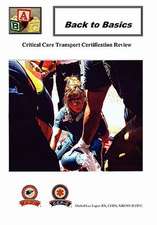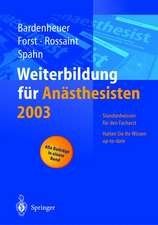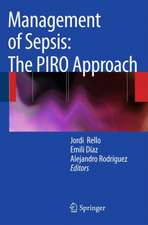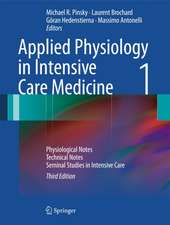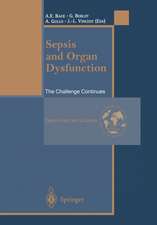ECMO-Extracorporeal Life Support in Adults
Editat de Fabio Sangalli, Nicolò Patroniti, Antonio Pesentien Limba Engleză Hardback – 12 mai 2014
This book presents a comprehensive overview of both pathophysiological and practical aspects of circulatory and respiratory extracorporeal support. The basics of ECMO, including its history, the “ECMO team”, cannulation, materials, and blood-surface interactions, are first discussed. The various indications for and particular characteristics of circulatory and respiratory extracorporeal life support are then described in detail in the main part of the book. Patient care during ECMO and monitoring of the ECMO patient are also carefully covered, with explanation of the management of technical and clinical complications and transport-related problems. Further topics include long-term therapy options beyond ECMO, such as ventricular assist devices and transplants, outcome, the new frontiers of ECMO for organ procurement and future challenges.
The authors are well-known experts in the field whose authoritative contributions and attention to practical aspects will be invaluable for novices and experienced practitioners alike.
| Toate formatele și edițiile | Preț | Express |
|---|---|---|
| Paperback (1) | 1105.61 lei 43-57 zile | |
| Springer – 23 aug 2016 | 1105.61 lei 43-57 zile | |
| Hardback (1) | 1422.45 lei 17-23 zile | +108.99 lei 6-12 zile |
| Springer – 12 mai 2014 | 1422.45 lei 17-23 zile | +108.99 lei 6-12 zile |
Preț: 1422.45 lei
Preț vechi: 1497.31 lei
-5% Nou
Puncte Express: 2134
Preț estimativ în valută:
272.27€ • 295.85$ • 228.86£
272.27€ • 295.85$ • 228.86£
Carte disponibilă
Livrare economică 26 martie-01 aprilie
Livrare express 15-21 martie pentru 118.98 lei
Preluare comenzi: 021 569.72.76
Specificații
ISBN-13: 9788847054264
ISBN-10: 8847054265
Pagini: 380
Ilustrații: XII, 489 p. 92 illus., 57 illus. in color.
Dimensiuni: 155 x 235 x 35 mm
Greutate: 0.92 kg
Ediția:2014
Editura: Springer
Colecția Springer
Locul publicării:Milano, Italy
ISBN-10: 8847054265
Pagini: 380
Ilustrații: XII, 489 p. 92 illus., 57 illus. in color.
Dimensiuni: 155 x 235 x 35 mm
Greutate: 0.92 kg
Ediția:2014
Editura: Springer
Colecția Springer
Locul publicării:Milano, Italy
Public țintă
Professional/practitionerCuprins
PART I History and Technical Aspects.- History of extracorporeal life support.- Developing a new ECMO program.- Basic Aspects of Physiology during ECMO Support.- Percutaneous cannulation: indication, technique and complications.- Surgical cannulation: indication, technique and complications.- Materials: cannulas, pumps, oxygenators.- Coagulation, anticoagulation and inflammatory response.- PART II ECMO for circulatory support.- Extracorporeal life support: interactions with normal circulation.- ECMO for ischemic cardiogenic shock.- ECMO for refractory cardiac arrest.- ECMO for post-cardiotomic shock.- ECMO in myocarditis and rare cardiomyopathies.- ECMO for high-risk procedures.- ECMO for severe accidental hypothermia.- ECMO for intoxications.- Newer indications for ECMO: Pulmonary embolism, pulmonary hypertension, septic shock and trauma.- Left ventricular rest and unloading during VA ECMO.- Weaning from extracorporeal circulatory support.- Treatment options for end-stage cardiac failure.- PART III ECMO for respiratory support.- Contemporary ARDS management.- Respiratory monitoring during VA-ECMO.- Structure of an ECMO network for respiratory support.- ECMO and thoracic surgery.- ECMO in the awake/extubated patient.- ECMO as a bridge to lung transplant.- Low-flow ECMO and CO2 removal.- Weaning from VV ECMO.- PART IV ECMO for organ procurement.- Heart beating and non-heart beating donors.- Lung reconditioning.- PART V Monitoring the ECMO patient.- Patient care during ECMO.- Echocardiography in VA and VV ECMO.- Hemodynamic monitoring.- Respiratory monitoring during VA-ECMO.- Neurological monitoring during ECMO.- Monitoring the ECMO patient: the extracorporeal circuit.- PART VI Complications of ECMO.- Complications of extracorporeal support and their management.- Troubleshooting common and less common problems.- PART VII Transport of the ECMO patient.- Fixed-wing and helicopter.- Ambulance.- PART VIII Conclusion.- Newer indications and challenges.
Recenzii
From the book reviews:
“This is a multiauthored, broad overview of extracorporeal membrane oxygenation (ECMO) support for various types of critical illness. … The audience includes senior trainees in cardiopulmonary critical care and intensivists facing difficult cardiopulmonary support problems and major surgical procedures. … Chapters are clearly written with well done illustrations, tables, line drawings, and photographs. … this well written overview from a national group of authorities is both timely and relevant.” (David J. Dries, Doody’s Book Reviews, August, 2014)
“This is a multiauthored, broad overview of extracorporeal membrane oxygenation (ECMO) support for various types of critical illness. … The audience includes senior trainees in cardiopulmonary critical care and intensivists facing difficult cardiopulmonary support problems and major surgical procedures. … Chapters are clearly written with well done illustrations, tables, line drawings, and photographs. … this well written overview from a national group of authorities is both timely and relevant.” (David J. Dries, Doody’s Book Reviews, August, 2014)
Textul de pe ultima copertă
Extracorporeal membrane oxygenation (ECMO) has been in clinical use for some 40 years, but it is only in the past decade that its application in the treatment of life-threatening circulatory and respiratory failure has truly flourished.
This book presents a comprehensive overview of both pathophysiological and practical aspects of circulatory and respiratory extracorporeal support. The basics of ECMO, including its history, the “ECMO team”, cannulation, materials, and blood-surface interactions, are first discussed. The various indications for and particular characteristics of circulatory and respiratory extracorporeal life support are then described in detail in the main part of the book. Patient care during ECMO and monitoring of the ECMO patient are also carefully covered, with explanation of the management of technical and clinical complications and transport-related problems. Further topics include long-term therapy options beyond ECMO, such as ventricular assist devices and transplants, outcome, the new frontiers of ECMO for organ procurement and future challenges.
The authors are well-known experts in the field whose authoritative contributions and attention to practical aspects will be invaluable for novices and experienced practitioners alike.
This book presents a comprehensive overview of both pathophysiological and practical aspects of circulatory and respiratory extracorporeal support. The basics of ECMO, including its history, the “ECMO team”, cannulation, materials, and blood-surface interactions, are first discussed. The various indications for and particular characteristics of circulatory and respiratory extracorporeal life support are then described in detail in the main part of the book. Patient care during ECMO and monitoring of the ECMO patient are also carefully covered, with explanation of the management of technical and clinical complications and transport-related problems. Further topics include long-term therapy options beyond ECMO, such as ventricular assist devices and transplants, outcome, the new frontiers of ECMO for organ procurement and future challenges.
The authors are well-known experts in the field whose authoritative contributions and attention to practical aspects will be invaluable for novices and experienced practitioners alike.
Caracteristici
Detailed coverage of practical aspects invaluable for novices Authoritative points of view that will appeal to experienced practitioners Tips and information on issues not covered in other books Written by well-known experts in the field



